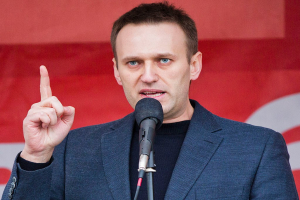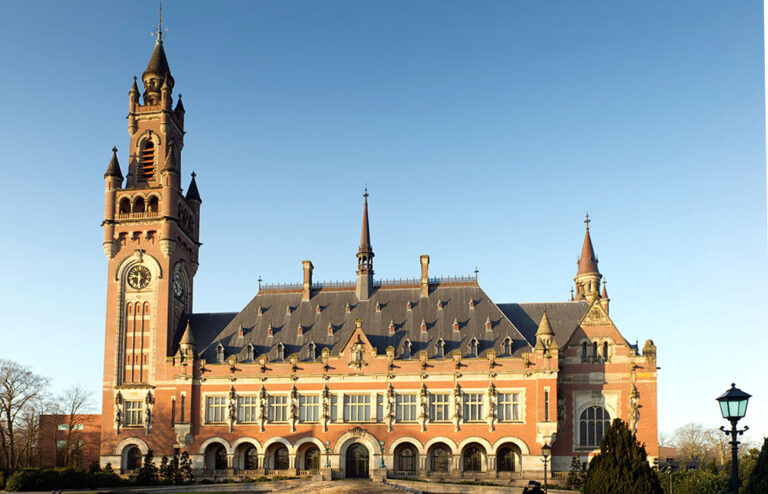
Jailed Russian opposition leader Alexei Navalny.
Aleksey Navalny
Washington DC: The already strained USA – Russia relations further dipped with the United States imposing today additional costs on Russia for the poisoning of Aleksey Navalny.
In addition, President Joe Biden also issued an Executive Order in order to take additional steps regarding certain Russian energy export pipelines to deal with the national emergency declared in Executive Order 14024 of April 15, 2021, with respect to the “unusual and extraordinary threat to the national security, foreign policy, and economy of the United States posed by specified harmful foreign activities of Russia.
The order responds to certain Russian energy pipeline projects intended to expand Russia’s influence over Europe’s energy resources that would weaken European energy security — including that of Ukraine and Eastern flank NATO and EU countries — and thereby threatens the national security, foreign policy, and economy of the United States.
The order blocks the property and interests in property of foreign persons identified by the Secretary of State, in consultation with the Secretary of the Treasury, in a report to the Congress pursuant to the Protecting Europe’s Energy Security Act of 2019, for engaging in certain activities or providing certain services to facilitate construction of the Nord Stream 2 pipeline project, among others.
Also read: Ahead of Ukrainian President’s Washington visit, Moscow moves international courts against Kyiv
“I have determined that it is necessary to block the property and interests in property of such persons unless a national interest waiver under section 7503(f) of the [Protecting Europe’s Energy Security Act of 2019] PEESA has been issued for such persons,” Biden stated.
Meanwhile, the U.S. Department of the Treasury’s Office of Foreign Assets Control (OFAC) and the U.S. Department of State joined the United Kingdom in imposing additional sanctions on Russia in response to the state-sponsored poisoning of Russian opposition leader Aleksey Navalny that took place one year ago today.
Specifically, OFAC designated nine Russian individuals and two Russian entities involved in Navalny’s poisoning or Russia’s chemical weapons program. This is the third use of Treasury’s discretionary authorities to respond to Russia’s use of Novichok against its own citizens. Additionally, the U.S. Department of State designated two Russian Ministry of Defense scientific laboratories that had engaged in activities to develop Russia’s chemical weapons capabilities.
Also read:
- UN Human Rights Commission expresses dismay over sentencing of Aleksei Navalny in Russia; calls for immediate release of all detainees
- Russian Election Commission chief tells Putin: “Our opponents discrediting the Commission”
“Today, on the one year anniversary of Aleksey Navalny’s poisoning by Russian government agents, we stand with our ally, the United Kingdom, to again condemn the Kremlin’s use of a chemical weapon to target one of Russia’s most prominent opposition leaders,” said Office of Foreign Assets Control Director Andrea Gacki. “Navalny’s poisoning was a shocking violation of international norms against the use of chemical weapons and was part of an ongoing campaign to silence voices of dissent in Russia.”
The new sanctions were imposed over Russia’s use of a “Novichok” nerve agent in the August 2020 poisoning of Russian opposition figure, pursuant to the U.S. Chemical and Biological Weapons Control and Warfare Elimination Act of 1991 (the CBW Act). These actions build upon those announced by the United States in March and “are consistent with the spirit of the CBW Act.
New sanctions imposed today under the CBW Act include:
- Restrictions on the permanent imports of certain Russian firearms. New and pending permit applications for the permanent importation of firearms and ammunition manufactured or located in Russia will be subject to a policy of denial.
- Additional Department of Commerce export restrictions on nuclear and missile-related goods and technology pursuant to the Export Control Reform Act of 2018.
These sanctions also include a continuation of measures imposed on March 2, 2021, as well as in 2018 and 2019 in response to the poisoning of Sergey Skripal and his daughter, along with the waivers associated with these sanctions.
These latest sanctions on Russia will take effect upon the publication of a Federal Register notice expected on September 7, 2021, and they will remain in place for a minimum of 12 months. The sanctions can only be lifted after a 12-month period if the Executive Branch determines and certifies to Congress that Russia has met several conditions described in the CBW Act, including (1) providing reliable assurances that it will not use chemical weapons in violation of international law, (2) it is not making preparations to use chemical weapons in the future, (3) it is willing to allow international inspectors to verify those assurances, and (4) it is making restitution to Navalny.
Today, the US Departments of State and the Treasury also designated numerous individuals and entities, including operatives involved in poisoning Navalny and entities that have developed Russia’s chemical weapons capabilities. “Together with the measures imposed under the CBW Act, these actions send a clear message that there will be accountability for the use of chemical weapons,” An State Department spokesperson said, adding that the individuals targeted today either participated in Russia’s operation to assassinate or surveil Navalny.
Navalny, the USA claimed, has been the target of Russia’s Federal Security Service (FSB) surveillance for many years, including through wiretapping and covert video surveillance. The U.S. government assesses that Russia’s FSB officers used the nerve agent Novichok to poison Navalny, causing him to fall gravely ill on August 20, 2020, while he was traveling back to Moscow after campaigning in Tomsk and Novosibirsk. Navalny fell ill about 30 minutes into the flight, prompting an emergency landing in Omsk, where Navalny was treated by local hospital staff. Russian officials continue to deny the existence of any toxin in Navalny’s blood, despite analysis from numerous European laboratories and an official report from the Organization for the Prohibition of Chemical Weapons (OPCW), which definitively concluded that Navalny was poisoned with a nerve agent from a group of agents, Novichoks, that only Russia has developed and used as chemical weapons.
The Russian operation against Navalny reportedly involved multiple individuals who were on the ground in both Tomsk and Omsk, as well as operatives coordinating the situation from afar. Eight of the individuals targeted today participated in Russia’s operation to assassinate Navalny. These individuals collaborated to surveil Navalny ahead of the attack, break into his hotel room and apply the chemical weapon to his personal belongings, and they attempted to erase any evidence of their operation following the attack. The ninth individual, Aleksei Sedov, is Chief of the FSB’s Service for the Protection of the Constitutional System and the Fight against Terrorism.
On March 2, 2021, the Treasury Department had sanctioned seven Russian government officials for their involvement in the poisoning of Navalny. Separately, in December 2018, OFAC also responded to Moscow’s March 2018 attempted assassination of former Russian military intelligence officer Sergei Skripal in Salisbury, United Kingdom, in an attack that similarly leveraged the use of a Novichok nerve agent. OFAC sanctioned several Russian persons associated with the Skripal attack, under multiple authorities, and also implemented prohibitions pursuant to the CBW Act.
Through today’s action, the United States said it was targeting additional Russian officials who commanded the operation or bear responsibility by nature of their positions. Through the action, the USA claimed it had further expanded its action to include rank-and-file security service operatives who were directly involved in the attack. Furthermore, several persons designated today were identified for their contributions to Russia’s continued proliferation of chemical weapons, in violation of international standards and agreements, it claimed.
– global bihari bureau





